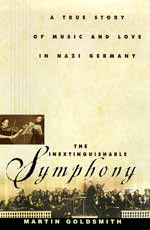|
The music of family history
The spring of 1933 brought the first of many insidious measures levied against the Jews of Germany, long before the so-called "Final Solution." The systematic institutionalization of anti-Semitism included the boycott of Jewish businesses, the confiscation of property, the prohibition of marriages between Jews and Aryans and, from the earliest days, the expulsion of Jewish musicians, actors and artists from the nation's orchestras, opera companies and theaters. Where did they go? Some, like conductors William Steinberg and Bruno Walter, emigrated while it was still possible.
Hundreds more joined the Jüdische Kulturbund (Jewish Culture Association), established in 1933 and overseen by Joseph Goebbels' Ministry of Public Enlightenment and Propaganda. The little-known story of this organization is brought to light in The Inextinguishable Symphony (John Wiley & Sons, 2000) by Martin Goldsmith, for years a respected music host and commentator on National Public Radio. Goldsmith masterfully interweaves the story of the Kulturbund with that of Günther Goldschmidt and Rosemarie Gumpert, two talented young Jewish musicians who performed in the Kulturbund orchestras in Frankfurt and Berlin until their escape from Germany in 1941. They would later become the parents of the author and his older brother Peter, also a public radio professional. Günther would give up his music career; his wife would become a respected member of the Saint Louis Symphony and later the Cleveland Orchestra. They would also be the only members of their respective families to survive the Holocaust. My passionate interest in music is not all I share with Martin Goldsmith. Like him, I am the child of a Jewish refugee from Germany. I can recite my mother's account of the events that took place in her hometown of Babenhausen, near Frankfurt: It was April 1933, about the same time that ground was being broken for the concentration camp at Dachau, and my then 14-year-old mother watched as my grandfather was kidnapped by a couple of Brown Shirts and beaten to within an inch of his life. The message was clear, and by October the immediate family had left Germany. The vast majority of the extended family would perish. This is a story I heard over and over again. I know it as well as I know my own name. I daresay the same can be said for many of the friends with whom I grew up in Washington Heights, a part of Manhattan known to us first-generation natives as "Frankfurt on the Hudson" because of the thousands of German Jews who settled there in the 1930s. We all knew something about the nightmarish treatment of our parents, and those of our friends. Martin Goldsmith, on the other hand, made the discovery of his family's story as an adult. The horrors of the Holocaust, as they pertained to his family, were simply not discussed as he was growing up. Goldsmith likens the subject to the great ash tree growing up through the house of Hunding, the warlord in Richard Wagner's Die Walküre. It was there, and everyone knew it. So where were his grandparents, aunts, uncles and cousins? After all, other children had them. Then there are the questions that inevitably come up about the organization with which his parents were involved. Granted, the Kulturbund saw to it that Jewish performers and audiences continued to have a rich and vibrant cultural life. Wasn't it also, though, the perfect Nazi propaganda tool? Didn't it give the Jews of Germany a false sense of security in a country bent on their destruction? One thing, says Goldsmith, is virtually without doubt: Had it not been for their participation in the activities of the Kulturbund, Gnther Goldschmidt and Rosemarie Gumpert, too, would surely have lost their lives. The author's father, a widower advanced in years, finally spoke of his youth in Germany, his willingness to sacrifice safe haven in Sweden for the woman he loved, their shared passion for music, and the fate which befell every one of his relatives and those of his adored wife. These stories opened the door for his son to begin a process of discovery which has resulted in this scrupulously researched, beautifully written book. This is the second in a series of book reviews written by members of the MPR classical music staff for Minnesota Monthly magazine. Mindy Ratner is host of Evening Classics weeknights on MPR. Go to MPR Books |
||||
MPR Home | News | Music Collection | Events | Radio Listening | Your Voice | About Us | Support Us | Help ©2005 Minnesota Public Radio | Terms of Use | Privacy Policy |
